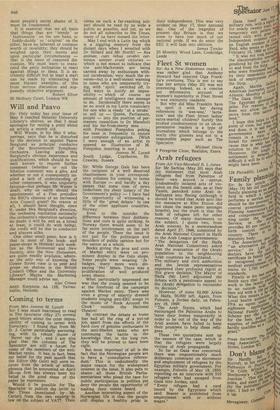Arab refugees
From Air Vice-Marshall R. I. Jones Sir: Mr Sarkiss (May 20) says that my statement that most Arab refugees fled from Palestine of their own accord is untrue. Undoubtedly isolated acts of violence on the Israeli side, as at Deir Yassin, panicked some Arab inhabitants into fleeing (although it should be noted that Arab acts like the massacre at Kfar Etzion did not cause the same panic amongst Israelis), but the truth is that the bulk of refugees left for other reasons. Of many statements on the subject, I quote two, from Arab sources. In a memorandum dated April 27, 1948, submitted by the Arab National Council in Haifa to the Arab League governments: "The delegation (of the Haifa Arab National Committee) asked that the evacuation of the (Arab) population to the neighbouring Arab countries be facilitated. . . . The military and civil authorities and the Jewish representatives expressed their profound regret at this grave decision. The Mayor of Haifa (Mr Levi) adjourned the debate with a passionate appeal to the (Arab) delegation to reconsider its decision."
However, of some 62,000 Arabs in Haifa, 56,000 left. Again, from Falestin, a Jordan daily, on February 19, 1949:
"The Arab States, which had encouraged the Palestine Arabs to leave their homes temporarily in order to be out of the way of the Arab armies, have failed to keep their promises to help these refugees, . . ."
These two quotations sum up the essence of the case, which is that the refugees were largely victims of Arab propaganda.
So far as Gaza was concerned, there was unquestionably much deliberate constraint on movement and employment of refugees by the Egyptian military government. For example, Falestin of May 19, 1950, reporting on an interview with 510 refugees who had escaped from Gaza into Jordan, said:
"Every refugee had a card issued by the Egyptians which said: Bearer is prohibited from
_ from
employment with or without wages."










































 Previous page
Previous page